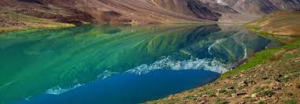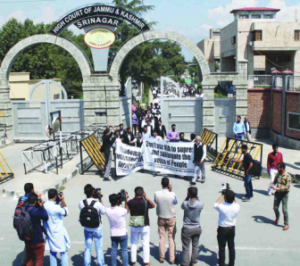
The waters of the land

Introduction
A bench of Justice Rajnesh Oswal stated, “Under Article 39 of the Indian Constitution, it is the
duty of the State to ensure that the ownership and control of the community’s material
resources are distributed in a way that best serves the common good. The respondents
(authorities) have undertaken the exercise to ensure fair distribution of the natural resources, and no one person or group of people can claim any right to the exclusive use of natural
resources.

The court made the remarks while rejecting a petition that had been brought by residents of the
village of Qasba Yar in the Shopian district, where they had asked the authorities to issue a
directive not to alter, divert, or extract any water in Yari Kohal (a local water body). Additionally, they had asked for guidance on how to stop the authorities for raising and finishing the new
Kohal’s construction.
They further requested that the authorities give them instructions so that the water from Yari Kohal can be used to irrigate the nearby agricultural land. They claimed that this was the sole means of irrigation for their land and that the the government had begun building a diversion of Kohal into the Shopian Irrigation Division without any “authority and justification.
Errors
Every water source in the State is and will remain the property of the Government, according to Section 3 of the Jammu and Kashmir Water Resources (Regulation and Management) Act, 2010. Any proprietary ownership, riparian or usage rights on such water resources granted in any individual, group of individuals, or other body, corporation, company, society, or belonging will, from the time of commencement of the Act, be deemed to have become terminated.

The respondents’ (authorities) action in reviving the canal to meet the needs of other villages
cannot be characterised as illegal, unauthorised, or without cause because the petitioners
(villagers) possess no vested right to demand any specific amount of water, especially since the
people who responded previously established the requirements of different villages.
Every water supply in the province is and will remain the government’s belongings, according to
the Supreme Court of the Kashmir Valley and Ladakh. This was said by a Justice Rajnesh Oswal-led panel in dismissing a request for court intervention from residents of the Shopian district village of Qasba Yar not to alter, divert, or remove any water from the Yari Kohal canal.
Crust of the Case
The Court noted that Section 3 of the Jammu and Kashmir Water Resources (Regulation and
Management) Act, 2010, states that the government owns all water sources in the state and will
continue to do so. The Court stated that the petitioners (people of the village of Qasba Yar) lack any legal standing to demand any specific quantity of water, especially because the government have already
established the needs of several settlements.
As a result, it stated, “the respondents’ (authorities’) action for reviving the canal to serve the needs of other villages are not qualify as illegal, unauthorised, and without any justification.”

Conclusion
The court stated: “As such, this court is of a considered opinion that the concern of the
petitioners is devoid any basis. This Court emphasises that those in charge have taken into
consideration requirements together for irrigation for the village Qasba Yar.”
The locals wanted the government to give them instructions so that the water from Yari Kohal
could be used to irrigate the nearby agricultural land in addition to trying to stop them from
raising and finishing the construction of new Kohal.
Additionally, the court stated that the authorities had previously taken into account the need for water for the community of Qasba Yar. “As a result, the Supreme Court is of the perspective taken into account that the petitioners’ concern is without any basis,” the court concluded.







